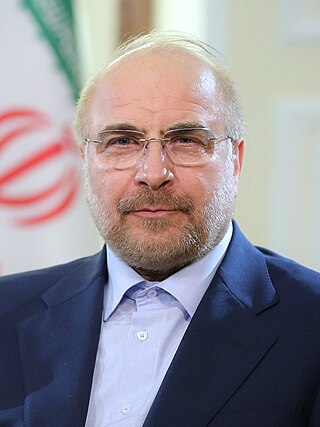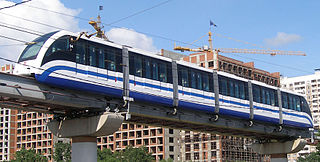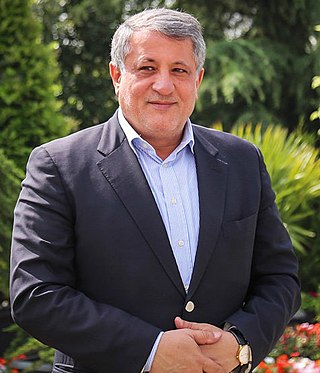Related Research Articles

Transport in Pakistan is extensive and varied, and serves a population of over 212.2 million people. In recent years, new national highways have been built, with the addition of motorways which have improved trade and logistics within the country. Pakistan's rail network owned by Pakistan Railways is also undergoing expansion in recent years. Airports and seaports have been built with the addition of foreign and domestic funding.

Akbar Hashemi Rafsanjani was an Iranian politician, writer, and one of the founding fathers of the Islamic Republic who was the fourth president of Iran from 1989 to 1997. He was the head of the Assembly of Experts from 2007 until 2011 when he decided not to nominate himself for the post. He was also the chairman of the Expediency Discernment Council.

The Mumbai Metro is a rapid transit (MRT) system serving the city of Mumbai and the wider Mumbai Metropolitan Region in Maharashtra, India. Mumbai Metropolitan Region Development Authority is the responsible authority for maintaining the metro system. Maha Metro is responsible for all the metro rail projects undergoing in Maharashtra except the Mumbai Metropolitan Area. The system is designed to reduce traffic congestion in the city, and supplement the overcrowded Mumbai Suburban Railway network. It is being built in three phases over a 15-year period, with overall completion expected in October 2026. Mumbai Metro is the sixth longest operational metro network in India with operational length of 46.4 km (28.8 mi) as of January 2023. When completed, the core system will comprise fourteen high-capacity metro railway lines and one metrolite line, spanning a total of 356.972 kilometres (221.812 mi), and serviced by 286 stations.

Presidential elections were held in Iran 17 June 2005, with a second round run-off on 24 June. Mohammad Khatami, the previous President of Iran, stepped down on 2 August 2005, after serving his maximum two consecutive four-year terms according to the Islamic Republic's constitution. The election led to the victory of Mahmoud Ahmadinejad, the hardline mayor of Tehran, with 19.48% of the votes in the first round and 61.69% in the second. Factors thought to have contributed to Ahmadinejad's victory include mobilization of mosque networks and conservative/hardline voters, and a protest vote against corrupt elite insiders and for "new political blood". A loyal supporter of conservative Supreme Leader Khamenei, Ahmadinejad kissed the leader's hand during his authorization ceremony. Officials reported a turnout of about 59% of Iran's 47 million eligible voters, a decline from the 63% turnout reported in the first round of balloting a week before.

Mehdi Karroubi is an Iranian Shia cleric and reformist politician leading the National Trust Party. Following 2009–2010 Iranian election protests, Karroubi was put under house arrest in February 2011 – reportedly ordered by the Supreme Leader of Iran – without officially being charged, although he is accused of being a "seditionist" and "traitor". As of 2021, he is still confined to his house.

Mohammad Bagher Ghalibaf or Mohammad Baqer Qalibaf is an Iranian conservative politician, former military officer, and current Speaker of the Parliament of Iran since 2020. He held office as the Mayor of Tehran from 2005 to 2017. Ghalibaf was formerly Iran's Chief of police from 2000 to 2005 and commander of the Revolutionary Guards' Air Force from 1997 to 2000.

The Tehran Metro is a rapid transit system serving Tehran, the capital of Iran. It is the largest metro system in the Middle East. The system is owned and operated by Tehran Urban and Suburban Railway. It consists of six operational metro lines, with construction under way on three lines including west extension of line 4, line 6 and north and east extension line 7.

Mohammad Reza Rahimi is an Iranian politician who served as the fifth first vice president from 13 September 2009 until 3 August 2013. His previous posts included governor of the Kurdistan province and vice president for parliamentary affairs.

The Moscow Monorail is a 4.7-kilometre-long (2.9 mi) monorail line located in the North-Eastern Administrative Okrug of Moscow, Russia. It runs from the Timiryazevskaya via Fonvisinskaya and VDNHa metro stations to Sergeya Eisensteina street. The monorail line currently has six stations. Planning of the monorail in Moscow started in 1998. This was a unique project for Russian companies, which did not have prior experience in building monorails. 6,335,510,000 rubles were spent by the city of Moscow on the monorail construction.

Mahmoud Ahmadinejad, born Mahmoud Sabbaghian, is an Iranian principlist and nationalist politician who served as the sixth president of Iran from 2005 to 2013. He is currently a member of the Expediency Discernment Council. He was known for his hardline views and nuclearisation of Iran. He was also the main political leader of the Alliance of Builders of Islamic Iran, a coalition of conservative political groups in the country, and served as mayor of Tehran from 2003 to 2005, reversing many of his predecessor's reforms.

Ahmad Masjed-Jamei is an Iranian reformist politician and academic who was chairman of City Council of Tehran from 3 September 2013 until 3 September 2014. He served as Culture Minister under President Mohammad Khatami from 2000 to 2005. He was elected a Tehran City Councillor in 2006 and was reelected in 2013.
Chennai Monorail was a proposal for a number of lines as part of mass transit system for the Indian city of Chennai. Originally the city planned to use monorail on all lines but many were subsequently changed to railways as part of the Chennai Metro.

Railway electrification in Iran describes the past and present electrification systems used to supply traction current to rail transport in Iran with a chronological record of development, a list of lines using each system, and a history and a technical description of each system.

Mojtaba Samareh Hashemi is an Iranian politician. He was a "senior adviser" to Iranian president Mahmoud Ahmadinejad and deputy interior minister for political affairs. He is said to have "strong ties to the Revolutionary Guard Corps and to the intelligence services" and to be "a constant presence at the president's side, in every cabinet meeting and during midday prayers at the office..." and acting "more as a cross between Iran's Karl Rove and a [American] president's chief of staff."
Following the 2009 Iranian presidential election, protests against alleged electoral fraud and in support of opposition candidates Mir-Hossein Mousavi and Mehdi Karroubi occurred in Tehran and other major cities in Iran and around the world starting after the disputed presidential election on 2009 June 12 and continued even after the inauguration of Mahmoud Ahmedinejad as President of Iran on 5 August 2009. This is a timeline of the events which occurred during those protests.

Urban rail transit in India plays an important role in intracity transportation in the major cities which are highly populated. It consists of rapid transit, suburban rail, monorail and tram systems. According to a report published in 2021, a total of 2.63 billion people travelled annually in metro systems across India's fifteen major cities, placing the country as one of the busiest urban rapid transit hubs in the world in terms of ridership. The combined length of 859 kilometres of metro systems in India makes it the fourth longest in operation in the world.
The 2011–2012 protests in Iran were a series of demonstrations in Iran which began on 14 February 2011, called "The Day of Rage". The protests followed the 2009–2010 Iranian election protests and were influenced by other concurrent protests in the region.

Tehran Metro Line 2, which opened between Sadeghieh and Imam Khomeini in February 2000, is 20.4 kilometers (12.7 mi) long, with 19 km (12 mi) as a subway and 1.4 kilometers (0.87 mi) elevated. At this time, there were 19 stations along the line, of which Imam Khomeini Station was shared by Line 1. Line 2 is coloured blue on system maps and runs mostly east–west through the city.

Mohsen Hashemi Rafsanjani is an Iranian politician, academic and engineer who served as a member and was chairman of the City Council of Tehran from 2017 to 2021. He was the deputy director of Iran's Islamic Azad University from 2013 until 2017 and chairman and CEO of Tehran Metro for 13 years. He was the main reformist member candidate for the fourth period of the Tehran city council in 2013 as Tehran Mayor, but lost to Mohammad Bagher Ghalibaf. In 2017, he was elected as a city councilor and later was elected as chairman of the council.
This is a summary of the electoral history of Mahmoud Ahmadinejad, an Iranian Principlist politician who was President of Iran (2005-2013) and Mayor of Tehran (2003–2005).
References
- ↑ "شوک پایان تعطیلات برای احمدی نژاد". 5 April 2010.